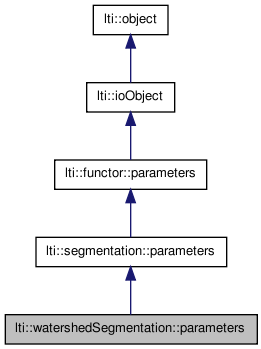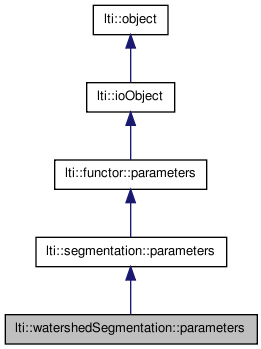

|
latest version v1.9 - last update 10 Apr 2010 |
|
the parameters for the class watershedSegmentation More...
#include <ltiWatershedSegmentation.h>


Public Member Functions | |
| parameters () | |
| parameters (const parameters &other) | |
| ~parameters () | |
| const char * | getTypeName () const |
| parameters & | copy (const parameters &other) |
| parameters & | operator= (const parameters &other) |
| virtual functor::parameters * | clone () const |
| virtual bool | write (ioHandler &handler, const bool complete=true) const |
| virtual bool | read (ioHandler &handler, const bool complete=true) |
Public Attributes | |
| bool | neighborhood8 |
| int | watershedValue |
| int | basinValue |
| bool | rainfall |
| ubyte | threshold |
the parameters for the class watershedSegmentation
| lti::watershedSegmentation::parameters::parameters | ( | ) |
default constructor
Reimplemented from lti::segmentation::parameters.
| lti::watershedSegmentation::parameters::parameters | ( | const parameters & | other | ) |
copy constructor
| other | the parameters object to be copied |
Reimplemented from lti::segmentation::parameters.
| lti::watershedSegmentation::parameters::~parameters | ( | ) | [virtual] |
destructor
Reimplemented from lti::segmentation::parameters.
| virtual functor::parameters* lti::watershedSegmentation::parameters::clone | ( | ) | const [virtual] |
returns a pointer to a clone of the parameters
Reimplemented from lti::segmentation::parameters.
| parameters& lti::watershedSegmentation::parameters::copy | ( | const parameters & | other | ) |
copy the contents of a parameters object
| other | the parameters object to be copied |
Reimplemented from lti::segmentation::parameters.
| const char* lti::watershedSegmentation::parameters::getTypeName | ( | ) | const [virtual] |
returns name of this type
Reimplemented from lti::segmentation::parameters.
| parameters& lti::watershedSegmentation::parameters::operator= | ( | const parameters & | other | ) |
copy the contents of a parameters object
| other | the parameters object to be copied |
| virtual bool lti::watershedSegmentation::parameters::read | ( | ioHandler & | handler, | |
| const bool | complete = true | |||
| ) | [virtual] |
write the parameters in the given ioHandler
| handler | the ioHandler to be used | |
| complete | if true (the default) the enclosing begin/end will be also written, otherwise only the data block will be written. |
Reimplemented from lti::segmentation::parameters.
| virtual bool lti::watershedSegmentation::parameters::write | ( | ioHandler & | handler, | |
| const bool | complete = true | |||
| ) | const [virtual] |
write the parameters in the given ioHandler
| handler | the ioHandler to be used | |
| complete | if true (the default) the enclosing begin/end will be also written, otherwise only the data block will be written. |
Reimplemented from lti::segmentation::parameters.
gray value to be used for basins in the resulting channel8
defines the neighborhood of a pixel.
if set to false (default), only the pixels horizontally and vertically bordering are considered to be neighbors.
if set to true, the four diagonally adjoining pixels are also taken into account.
Rainfalling Watersheds or Standard-Waterfall.
Default: true (Rainfall-Watersheds, they are much faster)
Threshold to eliminate noise in the src-image.
Default value: 0
To avoid oversegmentation, try higher values (for example 4). Another usual measure to reduce oversegmentation is also to denoise the input image, using median-filters, SUSAN denoiser or mean-shift denoisers, among many other possibilities.
gray value to be used for watersheds in the resulting channel8